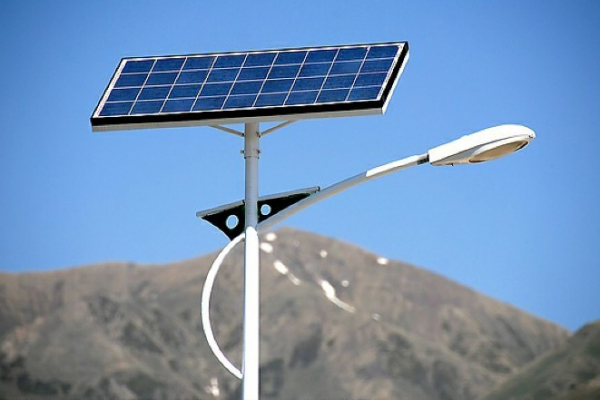
TOMSON Makhalima, Gwanda South ward 19 councillor, says life will never be the same again for Mashaba villagers after a solar mini-grid was rolled out to power over 2 800 households, three irrigation schemes, five business centres as well as a school and a clinic.
BY EVERSON MUSHAVA
For him, the country’s first ever solar-mini grid at the heart of his ward has not only brought food security, but civilisation to the remote and marginalised community.
He feels privileged to be the first councillor in the country to have a solar mini-grid in his ward, whose concept he prays should not start and end with Gwanda, but be rolled out across the country to mitigate the acute shortages of power Zimbabwe is facing.
“People’s lives have changed because of the electricity from the solar mini-grid,” Makhalima, who is a former officer in the presidential guard, told NewsDay at the handing over ceremony of the project to the community on Thursday last week.
“This is the way to go. Before the electricity, we used diesel pumps in our irrigation schemes, but the machines were too old and expensive to maintain. With the fuel crisis in the country, that could have left us without electricity to power our irrigation project?”
Zimbabwe is currently facing crippling power cuts with industry and households going for 18 hours a day without electricity.
According to power utility, Zimbabwe Electricity Supply Authority (Zesa), low water levels at the Kariba Hydro Power Station, generation constraints at Hwange Thermal Power Station and limited imports of electricity from South Africa and Mozambique have created a mismatch in the supply and demand of power.
- Chamisa under fire over US$120K donation
- Mavhunga puts DeMbare into Chibuku quarterfinals
- Pension funds bet on Cabora Bassa oilfields
- Councils defy govt fire tender directive
Keep Reading
The country, Zesa claims, now produces less than 820 megawatts (MW) from its three power stations against a daily peak demand of 1 600MW during winter and 1 400MW in summer.
The daily imports of at least 50MW from Eskom of South Africa and 100MW from Hidroelectrica de Cahora Bassa of Mozambique to close the demand gap have been suspended due to debts, leaving the country with no option but to roll out outages that are hurting the already chocked economy.
But after the commissioning of the first solar mini-grid, Makhalima said the country should invest in clean sources of power such as the solar energy which will be guaranteed as long there was sunshine, which Zimbabwe plentifully has.
“We hear of power cuts in Harare, Bulawayo and so on, but for us, we always have the power as long as we have the sun,” Makhalima said.
The project, implemented by Practical Action with the help of SNV, CARD and Dabane Trust, developmental non-governmental organisations and funded by the European Union (EU-ACP), the OPEC Fund for International Development, the Global Environmental Facility, the United Nations Development Programme has an output of 100KW that is powering a 25km radius.
Practical Action knowledge management and communications co-ordinator, Innocent Katsande said the decentralised mini-grid made up of 400 panels, has two energy centres and two stand-alone power units capable of selling power to three irrigation schemes, five business centres, a clinic, a school and a study centre.
It also has an energy centre that supports economic activities such as cold-rooms, agro-processing, welding and other similar activities that require substantial energy as well as powering a study centre that houses facilities that provide information communication technology, e-learning, internet, television, after-hours study and community information.
Speaking during the handover ceremony, Matabeleland South Provincial Affairs minister Abedinico Ncube applauded Practical Action for developing the project, saying with a constant supply of electricity, the village can be food-secure.
The three irrigation schemes now powered by the project, Mankonkoni, Rustlers and Sabase – with an aggregate hectarage of over 150, have, for many years been selling their surplus to the Gran Marketing Board.
“With more investment in solar energy, we can turn this place into a green belt. We have plenty of sunshine,” Ncube said. The solar project has been running since 2017 and Practical Action is, meanwhile, working on modalities to make if more viable before it is handed over to the community.
Mashaba Primary School headmaster Mbonisi Moyo Masera said with the new electricity-powered ICT centre his pass rate has galloped from 15% to 38% due to the interactive boards and tablets that have fascinated the pupils, reducing the rate of absenteeism.
Representing Energy deputy minister Magna Mudyiwa, Sosten Zivuku said through the Rural Electrification Agency, government has established a rural electrification masterplan anchored on solar.
With many solar mini-grids, Zimbabwe, described as one of the countries with the best weather, could increase its power generation and reduce load-shedding as well as conserve the foreign currency used in importing power. Most countries are investing in clean energy such as solar power, and in Germany, by 2016, solar accounted for between 6,2 to 6,9% of the country’s net electricity generation.
Germany prioritised continuous increase of renewable energy sources to its overall electricity consumption.
Practical Action regional director Kudzai Marovanidze, representing the implementing partners, said: “This site will be a showcase for how renewable energy can facilitate development in remote rural communities by enabling increased agricultural productivity, improved education and health delivery and local off-grid business enterprises.”











